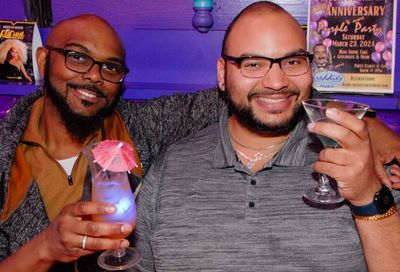Blood Lies: Gay Men Who Lie to Donate Blood
Some gay men are lying to circumvent the ban on donating blood

When Jeffrey started donating blood in 1988, it wasn’t exactly for altruistic reasons.
“The motivation was that you get four hours of administrative leave,” says Jeffrey, whose name has been changed to protect his identity. He was working in Washington, D.C. during his summers off from college. “When you’re in college and have no leave whatsoever, you’ll take the four hours whenever you can get it. I think they always scheduled it on a Friday, so you would basically get an early start on the weekend.”
Jeffrey wasn’t sexually active when he started donating, but that changed in 1992 when he came out to his family. As he began to explore his sexuality, he also continued to donate blood. He remembers a question on a donor form asking if he had ever had sex with another man at any time since 1977.
“I was a little offended by it,” he says. “First of all, the number was so ridiculous, and the question was stupid because everybody knew by then — at least I did, and I thought the general community knew — that if you didn’t have sex with condoms, you were really at risk. Of course I never did that, so I was just like, ‘Whatever.’”
Although Jeffrey chose to stop giving blood for a while, he was reeled back in by phone calls from various blood centers asking him to donate, because his O-positive blood was in such high demand. People with O phenotypes are considered “universal donors.”
“They wanted O-positive blood, so they would call me,” he says. “It wasn’t a robocall. It was somebody on the phone saying, ‘Help,’ who was going to look up where I was and find the closest and next available blood drive so I could give.”
At 46, Jeffrey has continued to donate, often through workplace blood drives. He chooses to lie on the questionnaire because he infrequently has sex, and always uses condoms when he does. He knows his HIV status is negative, so there’s no risk of passing on any diseases. And the collected blood is supposed to be tested for HIV, hepatitis and other bloodborne diseases, meaning there are plenty of other safeguards to ensure safety of the supply.
“I’m supposed to donate on Tuesday,” he says. “If I donate, the next time they come back is literally the day I can donate again. So that’s what I do. I just donate every time they come in.”
[polldaddy poll=9469398]
That’s not to say it’s all gone smoothly. During his sophomore year in college, his parents received a letter from the Red Cross that said he had tested positive for Hepatitis C. The Red Cross placed him on a deferral list, and Jeffrey went to get retested by his personal physician. The Red Cross was wrong. After providing a copy of the test results, he was removed from a deferral list and put back on the list of eligible donors. He doesn’t regret his decision to continue donating blood.
“I would hope that more people decide to lie and just donate anyway, because the supply is so low, the need is almost year-round now,” he says. “If people know that they are healthy, I don’t see why whoever they sleep with should be an issue in terms of donating blood…. They have at-home tests [for HIV] now. Why can’t the Red Cross have a test for that right up front?”
The American Red Cross and other blood collectors in the United States are currently bound by rules and regulations issued by the U.S. Food and Drug Administration (FDA) regarding blood donor eligibility. Last December, the FDA announced it would be changing its previous lifetime deferral for gay and bisexual men to a one-year deferral from the time of last sexual contact. The FDA has also recommended that transgender donors be screened based on the gender with which they identify, rather than on their assigned sex at birth. But implementation of the new guidelines has been slow: the FDA only just approved a new questionnaire reflecting the change in May, with many individual blood collectors planning to implement the changes later this year.
Blood donor history forms typically ask a range of questions, including how a person is feeling on that particular day, if they have taken aspirin or blood-thinners, the last time they donated blood, their history of travel outside of the United States, and their sexual behaviors over the past year. The answers are then used to help collection centers weed out donors who, in the FDA’s view, pose a safety risk to the blood supply.
“The Red Cross believes all potential donors should be treated with fairness, equality and respect, and that accurate donor histories and medically supported donor deferral criteria are critical to the continued safety of blood transfusion,” Beth Toll, external communications manager for the American Red Cross, said in a statement to Metro Weekly. She also noted that it is illegal in more than 30 states to knowingly donate blood with HIV or other infection.
“Although we are not aware of any laws that specifically make it illegal to untruthfully answer questions about sexual behavior, we rely on the honesty of our donors to help protect our donors and the safety of our blood supply,” Toll added. “Any donor who is less than truthful in their responses to the health history questions cannot be properly evaluated, may not be eligible to donate, and could put him or herself or a recipient at risk.”
But some argue that the FDA’s recommendations still single out gay and bisexual men for disparate treatment. It is something that is not borne out by the science surrounding HIV.
“We have called the change…to the lifetime ban a one-year celibacy requirement,” says Anthony Hayes, vice president of public affairs and policy at the Gay Men’s Health Crisis, a New York-based nonprofit HIV/AIDS prevention and advocacy organization. “What it actually is, is the same lifetime ban just dressed up differently.”
Hayes points to Italy and Argentina as examples of countries that have removed the ban on men who have sex with men donating blood. While there is always going to be some sort of deferral period involved with donating, Hayes argues that science, particularly advances in HIV testing, suggest that it could be much shorter. He also says the deferral should be applied equally to all potential donors.
“If we’re going to be realistic and talk about science, there are very few people that are in a relationship — gay, straight, bisexual, whatever, that are not going to engage in sexual intercourse,” adds Caleb Laieski, an activist who previously sued the FDA over its lifetime deferral period for MSM. “There are very few people that are going to go an entire year without intercourse.”
The need for blood and the restrictions on its availability due to the ban are often exposed following times of crisis, such as after the mass shooting at an LGBT nightclub in Orlando last month.
“So many people needed blood transfusions, and they were short,” says Laieski. “Honestly, there likely wouldn’t have even been a shortage of the needed blood if gay men were able to donate.”
“I think what we saw post-Orlando, tragically, was a real devastating, disappointing example of why Gay Men’s Health Crisis has been fighting to overturn the FDA blood ban for years,” adds Hayes. “There was a collective response by the people in Orlando. Many in the gay community wanted to participate in their community’s response to an attack, and they were not able to do that because the FDA still, in 2016, believe that gay and bisexual men’s blood is inherently diseased.”
While Laieski does not support or encourage lying when donating blood, he understands some may feel it’s their only option. “I cannot tell you how many people that I know that have lied and donated,” he says.
One of those people is Mark (name changed to protect identity), a 38-year-old gay D.C. resident who started donating because his family did so regularly. Mark initially stopped after he came out, because he was scared of lying on the form. But fear gave way to defiance.
“I did some research on it and it seemed to be perfectly safe [to donate] as long as you knew your status and were healthy,” he says. “Then I just realized it was nothing more than a discriminatory policy…. I decided the question was irrelevant and I lied on the form because it was none of their business.”
The research Mark sought out confirmed his suspicions that the question about having sex with other men was not inherently linked to the likelihood of passing on HIV or other diseases. Mark, who is HIV-negative and on PrEP as a form of prevention, has embraced lying on the form as his own method of activism to protest the restrictions placed on gay and bisexual men.
“I say, if you know your status and you’re healthy, go give blood,” he says. “I’ve lied about that question and if you feel comfortable doing that, go right ahead, because [blood donation] is a service we provide to other people. We shouldn’t be precluded from it.
“It shouldn’t matter whether you’re sleeping with someone of the same sex or someone of the opposite sex, they should treat people the same.”
Support Metro Weekly’s Journalism
These are challenging times for news organizations. And yet it’s crucial we stay active and provide vital resources and information to both our local readers and the world. So won’t you please take a moment and consider supporting Metro Weekly with a membership? For as little as $5 a month, you can help ensure Metro Weekly magazine and MetroWeekly.com remain free, viable resources as we provide the best, most diverse, culturally-resonant LGBTQ coverage in both the D.C. region and around the world. Memberships come with exclusive perks and discounts, your own personal digital delivery of each week’s magazine (and an archive), access to our Member's Lounge when it launches this fall, and exclusive members-only items like Metro Weekly Membership Mugs and Tote Bags! Check out all our membership levels here and please join us today!





















